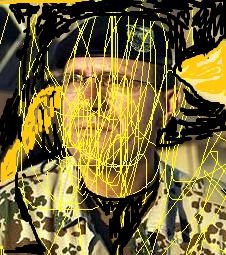Olivia McCain
The Separation
1
Afghanistan, is that close to Alaska? Next to Mexico,
maybe? I see a face, looming in the darkness. My face. I hear the wind,
whistling for a few seconds. And then, it seems to brush the rocks--- sweeping
the empty, dustfill plain.
I believed, for less than a second, that I heard me say
something. Something hoarse, coming from my dry mouth. I heard, K... I
heard, Kkk. Then it broke off.

It must be more than twenty years ago, maybe thirty. I
was seeing the film, a film full of dreams of wandering, of moving around.
Of distant places, somewhere--- in the midst of someone's world. Of his
imagination.
"...there is a war going on," the voice said. Phil's voice.
Was it the war that the Trojans fought, against the attackers?
One of them, having arrived from the West, having taken
part in the murder of Ajax, the murder of so many men and women and children
in that city, would head back. Wounded, too. Wounded in his heart, his
mind. In search of Ithaca, of his wife, Penny. During those endless attempts
to reach home, what he discovered was --- all of his comrades had been
transformed. Changed. Changed into swines. Circe, the lady of all wars.
Circe. Where does she live, in which house made of alabaster?
Expensive stairs, guest rooms for VIPs who will donate
their dearest stuff to the magician. It is here where they devise death.
It is here. It is here, the voice said.
2
Falling asleep, K. saw a man coming towards him. The man
was walking up the hill. He was keeping to the left side of the road
as he walked on. K. saw him, from the car; he recognized him. The man was
carrying a sixpack. He wore a faded red shirt, dirty blue jeans, and a
baseball cap. That's Phil, he muttered. Phil, Phil who has been discharged.
Phil who is haunted by memories he cannot talk about. Phil who was divorced
when he came back.
It was difficult to see him clearly know; other images
replaced the image of the man who had been his buddy in high school,
the man who gone to that distant land, too -- - a land that most people
could not point out on a map, if asked to.
Behind his closed eyes, K. saw the Finger Lakes like blue
serpents, lingering amid the land. He was seeing a wing of the plane and
heard the steady noise of the engine. It was a resassuring sound. He knew
it was here where his Penelope was waiting for him. This afternoon, he
would drive past the lake; the sun would fill the hazy blue air and its
light would glisten and dance on the water, and he would breathe the moist
humidity that made the heat almost unbearable during the hot days of August.
He was coming home. Ithaca, yes. I'll be back soon, he knew. Then, he began
to snore.
When the sun rose above the dark grey ridge, it filled
the valley below with a warm glow. He loved the stillness of the early
morning hours, the cool air, the absence of traffic noise, the harshness
of the mountains in the distance that were rose-colored now by the morning
light.
His men, as he called them, were having breakfast in the
canteen. The guards were posted, as usual, on watchtowers that allowed
a good view of the entire perimeter of the camp. The trucks and humvees
were lined up neatly, covered by dust that the wind poured on everything,
tents, the containers, the faces of his men, his face, and his uniform.
It had been a quiet night, as usual, in this section. The cars would patrol
the road later, as usual.
His thought would wander, he knew, back home, to Ithaca.
He longed for an end of this. Was it a war? An insurgency they were combating?
Against what, against whom? Against him and his men, he knew. As for the
rest of it, he comprehended very little. He knew, of course, the official
view of it. He knew, and accepted, that there has to be an official view.
There had been an official view in the 60s, in the 70s. His father, a soldier
for most of his life, had told him what it was like for them. The official
story. And then, the other story. The things they experienced. The things
they did. His father would not talk much, about the things they did.
By noon, there was the message. A plane had spotted something.
The pilot had radioed him, talking all the while, obviously in some Fritz
English, some Germanic English that he had difficulties to understand,
at first. The guy had said that a tanker had become stuck in the river.
It was several miles away, in the southern part of the valley. The talibs,
the pilot had said, had ambushed a convoy of tankers again that was heading
West. Several trucks had been set ablaze, but they had made off with one
truck, full of gasoline. Crossing the almost dry river, the heavy vehicle
had become stuck in the soft subsoil. The pilot had said, he couldn't tell
whether these guys were still around. It was possible, he had said. There
were people, with buckets, taking gasoline from the truck. K. had said,
Fuck it, they are trying to lighten the load. If they free the vehicle,
if they can attain the road again, they might try to create havoc at our
camp. It was then that the pilot in the reconnaisance plane had asked,
So what? K. had replied, Radio for support. They've got to bomb that fucking
tanker. But the pilot had been circling the spot, and he had said, They
are villagers. There are perhaps four score of them, perhaps more than
a hundred. I see women, I see kids. Do you really want us to bomb them.
K. had thought, briefly, of his men, of the possibility that the talibs
would free the tanker. Radio for support, he had repeated. Bomb that damn
tanker.
As he drove past the lake, it was just as blue as he remembered
it. He remembered everything. The gas station at the junction further down
in the valley where, as youngsters, they would fetch a couple of six-packs.
The cafe and adjacent barn by the roadside were they would go on Saturday
nights, dancing all night with the girls. It was here where he had met
Penny. Later they had moved to Ithaca. Later, that was when he had been
a lieutenant already. He had chosen that kind of career, just as his father
had.
In the Ithaca paper they carried a story. About all the
villagers that went up in flames. About parents who had lost there children
and who were now sueing his government. I did the right thing, damn it,
I protected my men, he told himself. I did not know there were all those
damn folks, those women, those children. If I had known I might have reached
a different decision, he told the journalists who came to interview him.
One of them wrote later on that the German pilot had been interviewed,
as well. The man contradicted him. The man had said, He knew damn well
there were scores of villagers. I TOLD HIM.
No, he said, no --- I never knew. If I had known --- he
said, and his voice became mute. Penny watched him, silently. She hadn't
asked him that --- so why did he say it? Why did he say it again and again?
Night after night, she felt his restlessness, as he turned and turned in
bed. Sometimes, dreaming, he would punch her, he would beat at something.
She knew he didn't know what he did. She bore it quietly.
When he was asked to come to the capital, to the house
made of alabaster, she went with him. Manly, he shook hands. Colonel
Kline, they said, you are a hero. A valiant man and a soldier who defends
his country. When they promoted him to the rank of general a month later,
he seemed to have forgotten his nightmares. He was happy. She could not
stand it anymore, by then, and left him. Quietly, without a word.
3
Glancing at the ridge, I feel nothing. This is a barren
land, full of barren people. Their faces, blurred, even if I rely on binoculars,
and they are good ones, made overseas, in that fucking country where they
talk a sort of English I can hardly understand. I have overcome those past
things; I look forward, forward to winning the war. We will depart soon:
the house made of alabaster has said so. But there will be other wars.
And more promotions.

Go back to Street
Voice # 5, Contents |